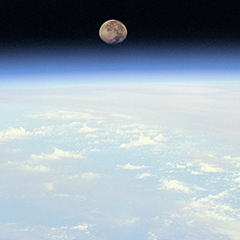Back from the Edge
Could our global ecosystem be careening towards a cliff? That’s what some scientists think. Erle Ellis, an associate professor of geography and environmental systems at UMBC, and a group of scientists from Australia and the United Kingdom are trying to talk their colleagues back from the edge in a new paper published this week in Trends in Ecology and Evolution.
There is growing agreement among scientists that we now live in an epoch called the Anthropocene – an age where humanity has transformed the world’s ecosystems, atmosphere and even its rocks. The question is whether humans are causing changes in Earth’s ecosystems that might soon trigger a global tipping point. Is the Anthropocene biosphere accelerating towards a point of no return?
While the idea of global tipping points is controversial, ecological tipping points at the local level are well studied. For example, “if you add nutrients to a lake it will continue on as before until you surpass a certain level of nutrients. Then the lake’s ecosystem will suddenly shift to a new state — it will have reached its tipping point,” says Ellis. “The lake will go from having very clear water to very turbid water, the kinds of fish will change and the chemistry and the ecology of the lake will change almost completely. It is then very hard to get that lake back into its previous state.”
A planetary tipping point in Earth’s ecosystems could occur, say Ellis and his colleagues, if ecosystems across the planet responded to uniform human pressures in similar ways, or if there were strong connections across continents and ecosystems that enabled the rapid transmission of ecological impacts across the planet.
Fortunately, Ellis and his colleagues are convinced that a planetary tipping point in ecology isn’t likely to occur on Earth. To begin with, organisms and ecosystems on different continents aren’t strongly connected. Animals, plants and microbes are greatly limited in their interactions by distance and barriers such as oceans and mountain ranges. Accordingly, responses to human pressures depend largely on local conditions. Even global climate change is unlikely to produce a coherent global shift in ecology because local ecosystems respond so differently to changes in climate.
“Essentially, local changes aren’t acting to push each other over the edge, as is the case with tipping points,” Ellis says. “They are simply adding up to cause long-term global changes in ecology.”
While we still need to think about global impacts, Ellis’ research puts the emphasis back on managing ecosystems at the local and regional level. That assertion has significant policy implications and could help us avoid misguided conservation efforts. “The disadvantage of thinking in terms of global tipping points,”says Ellis,“is that if you think you are far from the brink, no need to act, and if you think you’ve passed the tipping point you might as well give up.”
(3/1/13)

